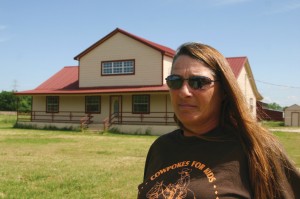Diana Clark remembers hearing her teenage son on the other end of the phone that January afternoon in 2008. She wasn’t surprised to hear from Clint. He still lived with her back then, and they stayed in touch while she was at work. Clark’s other two sons by two other men lived with their respective fathers but sometimes stayed with Clark as well, she said. The words tumbling out of Clint’s mouth sounded like a bad joke: A handful of men were at the Clark home hauling the family’s possessions outside and putting them in the yard. TVs. Computers. Whatever. Plopped in the grass.
The Clarks were being evicted in a freezing drizzle as nighttime neared.
“They kept the stuff they wanted to keep in the house,” Clark said. “The rest they took outside –– my bed, my son’s bed, all of our clothes. They just grabbed them and chunked them out in the yard. A lot of it got ruined. The only thing I saved was my kids’ pictures.”

The eviction was happening toward the end of the workday, under the supervision of a member of the constable’s office. Clark couldn’t get hold of an attorney on such short notice. She lived in unincorporated Johnson County, patrolled by the sheriff’s office.
Parks witnessed Clark’s eviction that day. Clark and Clint sat in her pickup truck and watched the carnage through the windshield. The next day, they loaded their wet and dirty belongings into a horse trailer. A filing cabinet containing important papers had been left in the rain with the drawers open, ensuring that her records were soaked, she said. She and Clint moved into a friend’s empty rent house for a month, half in shock, half in fury.
“I was pissed,” Clark said. “I didn’t know where I was going to go.”
They moved into a trailer house briefly, then into her brother’s house, then to San Antonio to live with her parents. Four moves in less than a year’s time.
Clark said she was no rent-dodger. The former rodeo cowgirl-turned-construction worker said she bought the 12-acre lot near Joshua in 2001 from Isbell, who was represented legally by White. The land, she said, was covered in scrub brush and scraggly mesquite trees. Clark said she spent months clearing the land with a bulldozer, building a pipe fence around the property, and building a barn with 11 horse stalls and a workshop. She claims in her lawsuit that she paid $3,000 down on the property and made monthly payments “well in excess” of the $450 note. She also alleges there was “no basis for foreclosure” and that the documents drafted on behalf of Optima Financial were done by White, even though he “had no authority to represent defendant Optima Financial.” In the lawsuit, she alleges fraud, saying the defendants used a “fraudulent deed of trust to foreclose” on her property.
“I was a single mother working my butt off and trying to get something for me and my kids,” she said. “Maybe I was an easy target. I don’t know.”
Working outside all of her life has left Clark’s skin a deep shade of brown but even more so now that she spends time lounging by a pool at a Cleburne apartment complex. Relaxing poolside might sound like the good life, but Clark doesn’t sound happy. She said she would prefer to work like she always had, building things, caring for horses, improving her property. Instead, her spirit fizzled. Seeing her belongings disappear sucked the wind out of her. The sour feeling still lingers eight years after her eviction. The house and property were later sold for $150,000, based on a sales contract entered as an exhibit in the Clark case.
These days, Clark lives with her boyfriend and eats more food and sleeps more than she would like.
“I slept for two years,” she said. “Depression sleep. I still catch myself getting depressed sometimes.”
Clark described how she bought her land through a contract for deed. Contracts for deed are sometimes used by buyers who can’t acquire or don’t want bank loans. The buyer makes monthly payments to the seller and receives a deed after paying off the sales amount. Unscrupulous sellers abused the practice before legislation in the 2000s began reforming contract for deed practices. Fort Worth played a part in that reform. The tornado that touched down here on March 28, 2000, tore apart houses in the neighborhood just north of what is now the West 7th Street corridor. People who had been making mortgage payments for years lost everything when their landlords cashed out and kept the insurance checks, based on published reports, leaving tenants without homes or equity.
Other common rip-offs include using technicalities, such as a late payment, to void deals, or selling the property to multiple parties or putting liens on a property without the buyer’s knowledge. Clark said her problems began with the Barnett Shale natural gas drilling boom of the 2000s.
Clark believed that when the property was deeded to her, she also acquired the mineral rights.
Clark recalled a natural gas company seeking her permission to perform seismic testing on her property in 2003. About a year later, she said, Devon Energy bought an easement on her property to bury a pipe. However, she said, she never heard from the company afterward and didn’t receive royalty checks after drilling began.
In 2004, Clark said she received a certified letter from White complaining that she didn’t have homeowners’ insurance and that she was delinquent on taxes. But Clark said her taxes weren’t due. And she wasn’t required to keep homeowners’ insurance because her house was paid off. Before she could respond to that letter, another arrived from White saying that she had three days to evacuate her property, she said.
“When I got that letter, I took it to an attorney along with my warranty deed, and that was the last I heard of it,” Clark said.
A few years later, though, Clark said she applied for a home equity loan to remodel her house. A bank employee told her that her title was “clouded,” she said.
Clark didn’t know what “clouded” meant. “Cloud on title” is a term describing liens and claims on a property that impair the ability of the owner to sell the property or, in Clark’s case, secure a home-improvement loan against the note.
In her lawsuit, Clark claims that White “drafted letters, a deed, and other paperwork in furtherance of the conspiracy on behalf of Optima Financial Inc.”
I called Isbell and asked for an interview about the Clark lawsuit. He replied, “Diana Clark is a drug dealer and drug user and never had a dime in that property. Why don’t you go to the Cleburne police station or the sheriff’s office and talk to them about her record and then call me back.”
Click. He hung up.
Clark’s record shows a conviction for driving while intoxicated in 1995 and driving with a suspended license in 2004. No drug convictions. I called Isbell back. He continued attacking Clark’s character, saying she is lazy and pointing to her multiple marriages and children by different fathers.
Isbell said Clark has cast herself as victim. But he didn’t want to discuss this active case in detail.
Isbell has known White and Parks for close to 30 years, he said. Isbell has used White’s title company, Chicago Title Co., many times for business transactions. Isbell said he will no longer do business with White.
“You have a letter from an appellate judge [saying] that [White] ought to be disbarred,” Isbell said. “Two juries –– 12 people in each one –– said he stole.”
Isbell was referring to the jury decisions in the Davis and Layton lawsuits against White.
I asked White what he thought of Isbell’s statements.
“I didn’t know I was on the outs with Mr. Isbell, but from what you are telling me, I guess I ought to be,” White said.
Clark hears all the accusation and denials flying around in all directions and wonders how everything became so convoluted and sour. After losing her house, she saw doubt in the faces of some people who heard her story and suspected she had missed mortgage payments, failed to pay taxes, or screwed up in some other way to lose her house.
“This was humiliating for me,” Clark said.
Parks said he’s been humiliated as well. He and son Kyle were both burned in business deals with White. Clark added both Parkses to the list of people she sued, right alongside White. But the Parkses are blaming White in the lawsuit for wrongfully using their Optima Financial financing business. In a deposition on the Clark case, Parks questioned White about using the Parkses’ corporation to draw up a fraudulent note and foreclose on Clark’s property.
The investment company was named in the suit. Now Parks is in the unusual position of helping a woman who is suing him.
“He’s trying to make things right,” Clark told me in our interview.
The tough woman lowered her head and began to cry while sitting on the couch inside her boyfriend’s apartment in Cleburne. She no longer owns a house or property. She composed herself quickly.
“It will work out,” Clark said. “I worked for everything. For someone to come in and take it like they did, I’m bitter about it.”
In the past, she kept her mind at peace by working with horses. That peace is gone.
“They took my livelihood,” she said. “I had 22 head of horses on that property. They took everything.”
******












Jeff: Great piece of work here. Thanks.